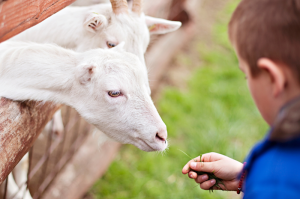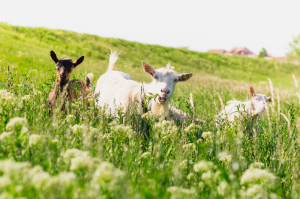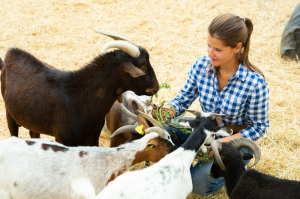Are Goats Friendly?
For many, goat experience has been limited to childhood petting zoo trips. These goats were often quite friendly because they were getting regular treats from their visitors. But as pet goats become more popular, you may wonder about the innate disposition of goats.
Are goats friendly? If raised with plenty of human interaction, goats are usually very friendly due to their intelligence and curious natures. Because they are prey animals, they can also be timid around people if not socialized from a young age. If you would like a tame, sociable pet goat, it would be a good idea to adopt your animal as a baby.
Read on to learn how you can increase your chances of having a friendly and social goat, and how well goats get along with other animals.
Goats Make Great Pets and Friendly Livestock
While it is becoming more and more common to keep goats as pets, they have many benefits beyond simple companionship. Goats are the most popular red meat eaten in the world (this may be surprising to you if you’re from the US), they produce ample milk while being easier to keep than cattle, and they are excellent at keeping the weeds down.
Furthermore, they require little space, are hardy animals, and are relatively low-maintenance (provided you have adequate fencing to keep them contained). Goats are really an all-in-one livestock, with the added benefit of intelligence, personality, and manageability.
Goats are used around the world for their meat and milk and are popularly kept by families in rural countries for dairy. They have gained popularity in the United States in the last several decades as well, particularly among small homesteads.
More and more cities and towns are hiring goat keepers to bring their herds to government-owned properties to cut down on weeds and thus help to prevent wildfires. There are a number of benefits to keeping goats, whether you are a family on an acre of land, or you are running a large dairy operation.
Are Goats Friendly With People? 
Goats can be very friendly with people and are easy to tame when compared to other livestock. Much of this can be attributed to their intelligence and their curious dispositions. Even though goats are herd animals, they tend to be more independent than other livestock.
When encountering someone new, they are more likely to approach the person and explore them (often by nibbling on a shirt or finger) than, for example, a sheep.
This is not to say that a goat is as naturally friendly as a Golden Retriever. Goats are prey animals, and their survival depends on their wariness and their alertness to potential threats. If you’ve not yet adopted a goat, there are a few things that you can look for to increase your chances of a social, personable pet.
Goat Friendliness Can Depend On Their Age
As with humans, and almost every other animal, the early years (or months) of a goat’s life are the most formative. Just like you would do with a puppy, it is very important to socialize your young goat from as early an age as possible. If a young goat has regular, positive interactions with humans, there would be a higher likelihood that your goat will find no reason to fear humans later in life.
You can adopt a goat of any age. If you would like to adopt an older goat, you can ask the goat’s keeper how he or she was raised. If the goat was raised with humans from kid-hood, there is a good chance he or she may be friendly and adaptable. If you can meet the goat ahead of time, you will be able to get a good idea of the goat’s personality.
If there are breeders or dairy farmers in your area, you may also have the opportunity to adopt a couple of “bottle babies”. Bottle babies are just as their name implies – very young goats who need to be bottle-fed. This is a very common practice with dairy goats – the doe is “freshened” (impregnated) to get her lactating.
The operation is dependent on the milk, so is often motivated to sell the kid shortly after birth so as to harvest and sell as much of the product as possible. The babies are removed from the doe and must be bottle-fed until they are capable of having solid food. Kids raised in this manner are often very friendly because they learn from birth that they can trust humans with their very survival.
Goat Friendliness Can Depend On A Goat’s Breed
There really are no inherently “unfriendly” goat breeds. But if you have your heart set on the friendliest of goats, it would be a good idea to research some of the breeds available in your area. Two very friendly goats often kept as pets are Pygmies and Nigerian Dwarf goats.
These two also happen to be the smallest of goat breeds, making them easier to manage for children and smaller adults than larger breeds. They are both native to West Africa, with Nigerian Dwarfs used as remarkably productive dairy goats, and Pygmy goats raised for their meat. Both breeds are known for their gentle, docile temperaments, and are commonly seen in 4H and FFA circles.
Other especially friendly breeds are the La Mancha, Alpine, Saanen, Oberhasli, and Nubian. Not coincidentally, all of these happen to be dairy goats. It’s likely that dairy goat breeds have been bred in part for their docile and manageable personalities – unlike goats kept for meat or for brush control, dairy does must be handled every day (usually twice daily) for milking.
This does not mean that you can’t have a wonderful pet in a meat goat – many praise the Boer, Kiko, Myotonic, and other breeds for their friendliness as well.
Goat Friendliness Can Depends On A Goat’s Sex
Finally, your goat’s sex can have an impact on his or her personality. It is said that does and wethers (castrated males) make the friendliest companions. You can also keep these two together without fear of unintentional breedings. While bucks can make good pets, they can also be significantly more aggressive when intact (and smellier, especially when they sense a female in heat).
While any goat may head-butt you when you come into the pen, bucks are more apt to show you the hard side of their horns and challenge you. Bucks are also more likely to challenge fencing, and cause destruction – again, especially when there is a doe within smelling distance. For the friendliest herd, stick with does and/or wethers.
Are Goats Friendly With Other Animals? 
Goats are herd animals and will become depressed and lonely if kept alone. It is important to keep at least two or three goats together and is best practice to adopt them in pairs. In addition to being friendly with one another, they are also excellent farm companions in general.
Goats can live peaceably with sheep, alpacas, cattle, llamas, horses, and other livestock. They have been known to make friends with dogs, cats, and even farmyard chickens.
Goats Can Be Very Friendly With Thoroughbreds
Goats are so well-known for their good natures, in fact, that they’ve been used for centuries (yes, centuries) as companions to racing horses. The average age at which a Thoroughbred starts racing is around 2 – they’re still babies.
These horses are brought up in a pasture with their mothers and other foals before they are sold. They end up spending a large portion of their days in a stall, which is a difficult adjustment. They can become nervous and stressed, showing behaviors like pacing, weaving, and cribbing. They may even go off of feed.
To calm the horses, trainers have long used goats as companions to them. Some use large goats like Boers, some use small dwarf breeds, and many use goats of unknown origin. The breed doesn’t matter – goats in general tend to have the calm, gentle, yet intelligent personality needed to comfort and provide companionship to these nervous horses.
Some trainers suggest that the goats form a stronger bond with the horses than the other way around, yet if separated the horses will often whiny and pace until their friends have returned.
Goats are so integral to the mental health of some of these racehorses, that years ago it was not uncommon for the trainer of a rival horse to sneak into the barn at night and make off with the goat companion of his competition. This would cause stress to the horse and would give the rival horse an edge in the race. This is where the term “got your goat” is believed to have derived.
Goats Make Wonderful, Friendly Companions
Goats have the potential to make friendly, personable pets as well as productive livestock, provided that you are thoughtful and intentional when finding the right animals to adopt. If you choose to adopt a couple of bottle babies, the hard work will pay off when they are grown, as you will likely be rewarded with in-your-pocket little (or big) pets.

